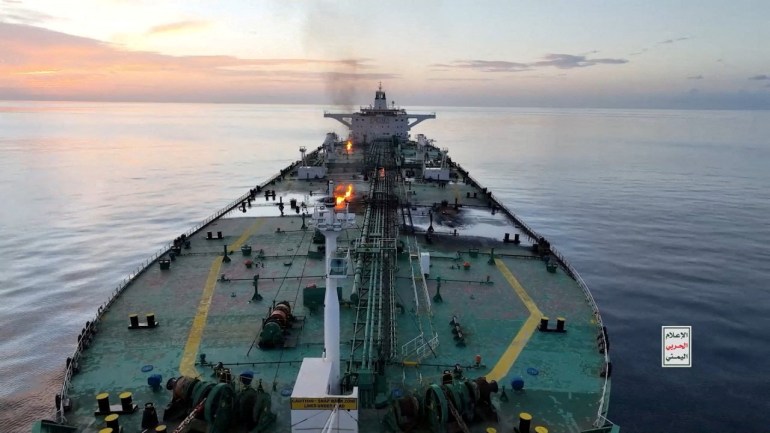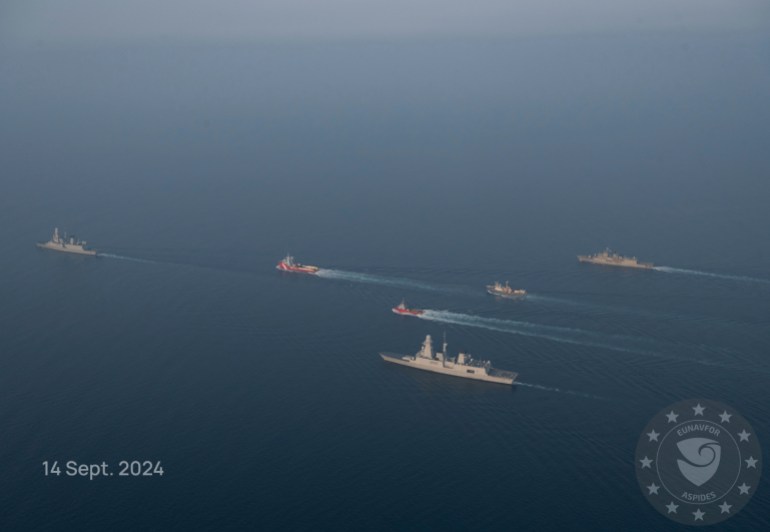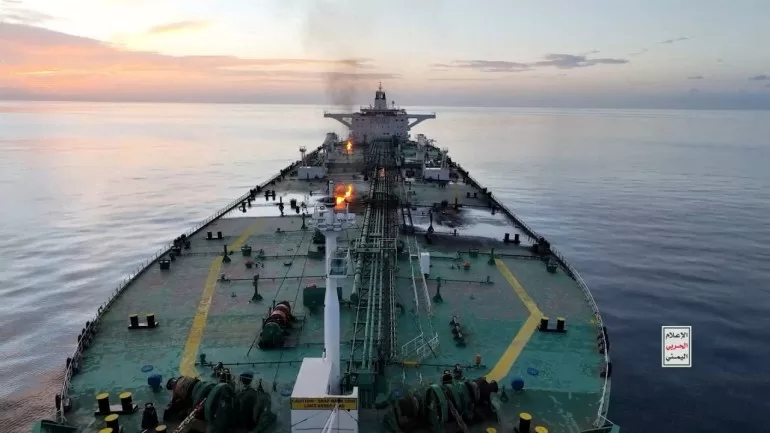Six weeks after Hamas launched the deadliest attack on Israel in the country’s history last October, the Palestinian group’s Houthi allies in Yemen seized control of a British-owned cargo ship in the Red Sea.
The Houthis’ audacious hijacking of the Galaxy Leader would mark the start of a sustained campaign of missile and drone attacks against commercial shipping in one of the world’s most important trade routes.
As the war in Gaza approaches the one-year mark on October 7, Houthi attacks are still disrupting commercial shipping, exposing the vulnerability of the supply chains that form the backbone of international trade.
While a United States-led international force has been able to thwart many attacks, commercial ships continue to be targeted and operators remain hesitant to use the waterway, raising the likelihood that trade will continue to suffer as long as conflict persists in the Middle East.
“Until a broader peace agreement is reached, the risks in the Red Sea are unlikely to diminish significantly,” Majo George, a professor at the Business School of RMIT University Vietnam, told Al Jazeera.
“In the meantime, shipping companies are expected to continue avoiding the Red Sea in favour of safer, but costlier, alternatives.”
The Houthis, which like Hamas are backed by Iran, carried out 130 attacks in the Red Sea between the start of the war and September 20, according to the nonprofit, Armed Conflict Location and Event Data (ACLED).
Most of the attacks were directed at commercial shipping, although some targeted Israel or US military vessels.
The Yemeni group has said that it considers any ship linked to Israel or its allies a target, casting its attacks as a show of support for Palestinians facing Israeli bombardment in Gaza. However, it has also attacked vessels with no obvious connection to the conflict. More than 41,700 Palestinians have been killed in Israel’s war on Gaza over the past year.

Even though the number of ships targeted is low relative to the volume of traffic, the Houthis’ strategy has proven effective at raising shipping costs, including insurance and pay for sailors working in high-risk areas, said Stig Jarle Hansen, an associate professor at the Norwegian University of Life Sciences.
“The success rate of Houthi attacks is low, but they don’t need to hit accurately, as long as they manage to scare international actors, they have achieved a victory, since they increase insurance prices and thus cause increased costs around the world,” Hansen told Al Jazeera.
Cargo traffic through the Suez Canal, which links the Red Sea and the Mediterranean and carried 10-15 percent of global trade before the war, has plummeted as shipping companies have moved to reroute shipments around the southern tip of Africa.
As of mid-September, average daily transits through the Suez Canal stood at 29, compared with about 80 last October, according to PortWatch, a database run by the IMF in collaboration with Oxford University.
Over the same period, average daily trade volume dropped from about 4.89 million metric tonnes to 1.36 million metric tonnes, according to PortWatch.
“Clearly, the attacks must stop,” Anna Nagurney, an expert on logistics and supply chains at the Isenberg School of Management, UMass Amherst, told Al Jazeera.
“The Suez Canal, built over 150 years ago, is a critical supply chain network link for global trade and there are many ancillary repercussions, including Egypt receiving much reduced payments for its use.
“Without efficient, safe, cost-effective transportation routes trade disruptions will continue with added delays and costs,” Nagurney added.
For shipping lines, rerouting trade around the Cape of Good Hope has increased transit times by 10-14 days and pushed up freight rates as much as threefold at certain periods during the past year.
“This rerouting incurs approximately $1m in additional fuel costs per trip,” George said.
“Beyond the financial burden, the extended routes contribute to higher greenhouse gas emissions due to increased fuel consumption, further exacerbating environmental concerns.”

Elevated shipping costs also threaten to push up the cost of everyday goods.
In February, JP Morgan Research estimated that the disruptions in the Red Sea could add 0.7 percentage points to global core goods inflation during the first half of 2024 if higher container shipping costs were to persist.
The Centre for Economic Policy Research, a London-based nonprofit, has estimated that global inflation could rise by an additional 0.18 percentage points in 2024 and 0.23 percentage points in 2025 if the de facto closure of the Suez Canal is not resolved before the end of this year.
While there is wide agreement on the need for cooperation among countries to minimise disruptions to global trade, analysts see limited options for effectively responding to the Houthi campaign as long as the group is determined to keep launching attacks.
Hansen said that the US and United Kingdom air strikes on Houthi targets in Yemen were more “symbolic than having real value” and governments would be better off boosting their capabilities to intercept missiles and drones in the waterway.
“It did not scare the Houthis,” he said.
The Houthis, he said, “were able to hide and secure much of the equipment needed to launch attacks. When intervening militarily it becomes important to assess the possibilities for success, otherwise one can save both lives and money by abstaining.”
Jayanta Kumar Seal, a professor of accounting and finance at the Indian Institute of Foreign Trade, said it was hard to see a breakthrough in the crisis without an end to the conflict in the region.
“The crisis is becoming complicated and more countries are getting involved. Some experts are of the view that things might change after the US presidential election, but I have doubts,” Seal told Al Jazeera.
“We must find some alternatives. The Cape of Good Hope is a much longer route and increases the transit time and freight and other costs substantially.”
